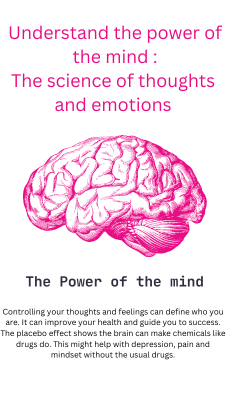Controlling your thoughts and feelings can define who you are. It can improve your health and guide you to success. The placebo effect shows the brain can make chemicals like drugs do. This might help with depression, pain and mindset without the usual drugs.
Also, what you believe affects how happy and successful you are. If you mix belief with action, you can go far. Being aware of your usual thoughts can change how your brain works. This lets you master your mind’s true power. Dr Joe Dispenza’s research demonstrates that, with proper instruction and focused intention, you can produce real change in your biology. In this video he dicusses the important of observing your mind to unlock the power of your mind. You can check his official website here: https://drjoedispenza.com/
Key Takeaways
- Recognize the impressive potential of your mind to affect physical healing and emotional well-being.
- Belief systems and your determination to take action can significantly shape your life’s trajectory, both personally and professionally.
- A conscious shift in perspective can redefine your reality, leading to new neural pathways and thought processes.
- Embrace the knowledge that the mastery and power of the mind are key factors in achieving a state of optimal mental wellness.
Exploring the Mind-Body Connection
Science has long been interested in the link between our physical health and our mental state. Recently, we’ve seen solid proof of how our thoughts and emotions affect our bodies. In this video Liz and Dr Michael join the show to discuss the profound influence of Dr John Sarno on their lives, and the potentially transformational power of ‘Mind-Body’ therapies.
Dr Sarno’s work was inspirational and cured many of their chronic pain,The Dr. Sarno method is an alternative approach to managing chronic pain that emphasizes the role of emotional and psychological factors in pain perception.
CLICK HERE for his book The Mind Body Prescription
There is also a movie named “All the Rage Saved by Sarno” Using a first-person approach to explore the work of renowned physician Dr. John Sarno and his radical methods to treating back pain, All The Rage examines the connection between emotions and health. Featuring interviews with Howard Stern, Larry David, Senators Bernie Sanders and Tom Harkin, and other luminaries, All The Rage offers a profound rethink of our health care.
The Placebo Effect and Mental Wellness
Let’s talk about the placebo effect. It’s when a patient gets better, not from the actual medicine but because they believe it will help. In many cases, this belief can lead to real improvements in health. This shows the amazing connection between our thoughts and our body’s actions.
Neurochemical Responses to Thoughts and Emotions
Our feelings and thoughts can change our body chemistry. A good mood can boost serotonin, making you happier. This is similar to how antidepressants work. But, long-term stress can lead to more cortisol. And this is linked to issues like high blood pressure.
Understanding this link, and the power of our mind, helps us make better health choices. It shows us ways to use our thoughts to benefit our physical health. This knowledge is a key step towards a healthier and more balanced life.
Demystifying Cognitive Psychology
At the core of cognitive psychology is how thought patterns affect our actions and feelings. It shows us how our thinking impacts our lives. The way we see challenges can change how we feel and act.
Understanding the link between thinking and feeling is crucial. Studies show our thoughts affect our feelings. And our feelings can also change our thoughts. This process affects how we react to things in our lives.
Changing how we see stress can change how it affects us. Seeing stress as a challenge can improve how you feel. This change can make you more emotionally strong and successful.
Think about changing how you respond to stress. Learning specific mental strategies can help you do this. This change doesn’t just help personally. It can boost your career as well.
| Concept | Impact on Psychological Well-Being |
|---|---|
| Stress Perception | Viewing stress as manageable leads to increased resilience and lower anxiety levels. |
| Emotional Regulation | Enhances emotional intelligence, aids in conflict resolution, and improves relationship quality. |
| Behavioral Adaptation | Adapting behaviors based on cognitive assessments can lead to more effective decision-making. |
Studying how to use our thoughts can bring big benefits. It makes the complicated human mind clearer. And it gives us ways to improve our mental skills. This knowledge can lead to better mental health.
The Intricacies of Emotional Intelligence
Emotional intelligence is key to understanding and controlling emotions. It’s also about knowing and affecting how others feel. It’s at the heart of cognitive psychology, balancing self-awareness with social skills. These skills lead to personal and social mastery that helps in relationships, at work, and with self-esteem.
Improving emotional intelligence is an ongoing journey, thanks to neuroplasticity. Our brains can keep learning and changing. This means we can get better at empathy, controlling our emotions, and improving our social interactions. Practicing emotional learning and being mindful boosts your emotional skills.
It starts with knowing and handling your own feelings. Understand why you react the way you do. Learning to control and guide your emotions supports you in difficult times. This way, you can make smart, thoughtful choices rather than quick decisions based on momentary feelings. This is self-regulation at its core.
Empathy is another crucial part of emotional intelligence. By imagining how others feel, you strengthen your brain’s ability to empathize. This makes your relationships stronger and your social life better. Emotional intelligence helps link our private thoughts to the social world, connecting us to others in meaningful ways.
In the end, emotional intelligence allows you to understand human emotions better. It helps you in your interactions with others. Learning about emotional and cognitive psychology makes you not only happier but also more helpful to those around you. It makes our society more caring and compassionate.
This article by Verywell Mind gives great overview of EI
Understanding the Power of the Mind, the Science Between Thoughts and Emotions
Exploring thought-emotion science shows how deeply it affects us. Mastery over what we believe and our feedback loops is key. It impacts our happiness and success in many areas of life.
The Direct Impact of Your Belief Systems
Your beliefs shape how you see and act in the world. Whether you choose them or learn them, they’re crucial. Changing your beliefs can help control your emotions and actions.
The Feedback Loop of Thoughts and Reality
Your thoughts and what happens in your life form a feedback loop. What you mainly think can become how you see the world. You can change this cycle to better reach your goals, improving your mental and emotional health.
This dynamic between thoughts and feelings goes beyond personal results. It affects how we connect with others and can even prove scientific hypotheses. For example, placebo studies show the mind’s role in wellness, with effects ranging from 15% to 72% effective.
The table below showcases how different philosophical views impact our thinking and the mind:
| Philosophical Perspective | View on Mind | Impact on Thought Processes |
|---|---|---|
| Dualism | Mind transcends physical existence | Encourages exploration of metaphysical aspects of thought |
| Physicalism (Functionalism) | Mind is what the brain does | Focuses on practical, observable outcomes |
| Identity Theory | Mind is synonymous with the brain | Promotes understanding of neurophysiological processes |
Combining thought-emotion science with the study of beliefs and feedback loops improves our lives. Reflecting and tweaking these components can change our life’s path for the better.*
Neuroplasticity: The Brain’s Ability to Rewire Itself
The idea of neuroplasticity is key in cognitive psychology. It shows the brain can change and grow. This change is important, letting us form new ways of thinking in response to new things. Knowing about neuroplasticity helps us break old mind and behavior patterns by practicing new, focused mental activities.
Your brain holds about 86 billion neurons and works through over 150 trillion connections. These connections change and get stronger as you learn and think. This ability to change is key in learning new things, healing from injury, and coping with life changes.
To make the most of neuroplasticity, it’s important to know these brain changes keep happening all your life, not just when you’re young. Research shows that trying new things and keeping your mind active can make new brain connections at any age.
| Activity | Impact on Neuroplasticity |
|---|---|
| Physical Exercise | Increases BDNF levels, enhances functional connectivity, supports the growth of new neurons. |
| Mindfulness and Meditation | Improves focus, reduces stress, and promotes the reformation of neural pathways for emotional regulation. |
| Learning New Skills | Facilitates the creation of new neural networks, boosts cognitive flexibility and problem-solving abilities. |
| Social Interaction | Stimulates cognitive processing, enhances memory and emotional health through engaged, meaningful communication. |
To get the most out of your brain’s malleability, try regular exercise, mindfulness, learning new skills, and being social. These things help your brain stay flexible and keep you mentally healthy. This way, your brain can adapt and grow even as life changes around you.
By understanding and using neuroplasticity, you can do more than just recover. You can greatly change your life for the better. This is not only important for learning and remembering but also for taking control of how your brain develops, leading to a better life in many ways.
Mindfulness Practices: Techniques to Enhance Psychological Well-Being
In a fast-paced world, mindfulness practices are key. Using techniques like visualization and meditation helps improve psychological well-being. They give us tools to handle stress and boost our thinking skills.
Visualisation and Its Effect on the Mind
Visualisation is at the heart of mindfulness. It means imagining positive outcomes and scenes. This connects with better mental health by turning thoughts into reality. When you imagine success or peace, you make your mind stronger in those areas. This shapes your thinking towards positive results.
The Role of Meditation in Cognitive Function
Meditation is another key part of mindfulness. It’s about being mentally still and clear. This practice can make your memory and focus better. Doing meditation daily can make you feel emotionally stronger. It helps you stay balanced in life’s ups and downs.
Studies show that mindfulness can lower stress and help with emotional issues. Places like hospitals, schools, and companies are adding these practices. They want to make their communities healthier and stronger.
with>
| Benefit | Details |
|---|---|
| Anxiety and Depression Reduction | Mindfulness helps lessen anxiety and depression symptoms. |
| Sleep Improvement | Doing mindfulness regularly can improve sleep. |
| Enhanced Cognition | Meditation boosts focus and thinking skills, which are important for success. |
| Diet and Lifestyle | Many who do mindfulness say they make healthier choices. |
Visualization and meditation can improve your mental and emotional health. They bring peace and make you resilient in daily life. Doing these practices daily can transform how you see and live your life.
The Science of Thoughts: Forming Neural Pathways
In the field of cognitive psychology, the science of thoughts looks at how our mind works. It shows us how thoughts turn into actions through neural pathways. Think of these pathways as roads our minds travel on. They impact everything we do every day.
Our brain isn’t set in stone. It changes based on what we do and think. Like paths in a forest, our neural connections get stronger with use. This shows how our brain can keep developing thanks to its plasticity. This means it can always change and grow.
Learning about how our brains create pathways can change how we see habits. Doing things over and over can make these pathways stronger. Luckily, our brain can make a lot of connections. This is because it has many neurons.
But, not all pathways are good for us. Some can lead to bad mental habits. The good news is we can change this. Learning new things and having new experiences helps build new pathways. This can help us think and feel better.
Encouraging our brain to make new connections is really important. This process can help us in many ways. For example, it can help us manage our emotions better. We do this by changing where our thoughts go. Doing this, we can have better emotional reactions.
Changing our neural pathways is key to changing our minds and emotions. By understanding this process, we can make big changes in our lives. We have the power to shape how we think and feel every day.
So, the study of thoughts and how our brain works isn’t just for school. It’s a tool for making our lives better. By using our brain’s ability to change, we can be happier and more emotionally stable.
The Art of Thought Mastery
In the journey of self-improvement, thought mastery is key. It’s about finding a balance. You must create positive thoughts and tackle negativity. This mix helps your mind and emotions. It builds resilience for a better life.
Creating Positive Thought Patterns
Creating positive thoughts involves more than just avoiding bad ones. It builds a strong mental and emotional foundation. Your mind releases feel-good chemicals. This helps you face challenges better and recover from tough times.
Confronting Negativity and Restructuring Your Mental State
To deal with negative thoughts, you must face them. But, don’t get stuck in them. Change them to help you grow. This approach lowers stress hormones, making you more positive and stable.
The table below shows how positive and negative thoughts affect your feelings:
| Aspect | Creating Positive Thoughts | Confronting Negativity |
|---|---|---|
| Biochemical Impact | Increases release of dopamine and endorphins | Reduces cortisol levels |
| Psychological Impact | Enhances motivation and resilience | Improves mental clarity and reduces stress |
| Outcome | Propels toward success and well-being | Facilitates emotional stability and growth |
Practicing thought mastery means changing how you see things. You learn to actively shape your life story. It’s about more than fighting bad thoughts. It’s creating a positive way of thinking.
Mindfulness Practices: Implementing Mindful Living Habits
Integrating mindfulness practices isn’t just an exercise; it’s about cultivating habits that underpin a lifestyle conducive to mental wellness. These habits are key for deep changes, like lowering stress and improving how you work with others. To grab the benefits of mindfulness, add these practices to your daily life:
- Meditation sessions to strengthen concentration and reduce stress.
- Regular mindfulness exercises like focused breathing or sensory observation.
- Mindful eating to enhance dietary habits and body awareness.
Creating habits that keep you mindful can greatly improve your life. It’s not just about meditation now and then, but making mindfulness part of every day.
Mindfulness means being fully focused on now. By being mindful, you can notice your thoughts and feelings but stay neutral. Instead of missing what’s happening now, mindfulness helps you enjoy this moment, not the past or future.
“Mindfulness isn’t difficult, we just need to remember to do it.” – Sharon Salzberg
Here are some numbers to motivate you:
| Effect of Mindfulness | Statistic |
|---|---|
| Reduction in symptoms of anxiety and depression | Significant reduction observed in multiple studies |
| Improvement in sleep quality | Common outcome among regular practitioners |
| Enhancement of cognitive function | Increased grey matter density in key brain areas |
| Change in brain structure | Physical changes leading to improved emotional regulation |
To start living a more mindful life, begin with small steps. Dedicate yourself to a quick morning meditation or a brief mindfulness practice before eating. As you keep these habits going, you’ll see changes that will benefit not only you, but those around you too.
Remember, making mindfulness part of your life demands steady effort. With small changes and a solid mindfulness commitment, better mental health and overall well-being can be yours.
Please read my article about Alan Watts https://itsinmymind.com/alan-watts-and-his-visionary-ideas-exploring-wisdom/ here
His teachings encourage us to find a balance between fully being in the moment and feeling connected to something deeper. This, he says, is a path to both personal growth and awakening.
Conclusion
The journey to understand the power of the mind is exciting. It takes you through fields like cognitive psychology and shows the importance of emotional intelligence. It also introduces you to mindfulness, which is changing how we view the mind. This journey teaches us how much our thinking affects our health, both physically and emotionally. Studies show that a positive mindset helps not just with sickness but also with eating well and handling stress.
The brain’s ability to change, known as neuroplasticity, brings hope. It means our brains can learn new ways even after forming old habits. Through mindfulness practices, you learn to use this ability for your benefit. A study from Denmark even found that believing you’re taking medicine can heal you. This shows the power our minds have on our health, highlighting our natural ability to heal.
In the end, your quest for mental wellness is guided by a positive mindset. Use what you’ve learned from cognitive behavioral therapy and studies on teens to improve. Combine these lessons with taking positive steps. By doing this, you turn your thoughts into reality. This approach ensures you’re on a path of improvement and self-mastery.


